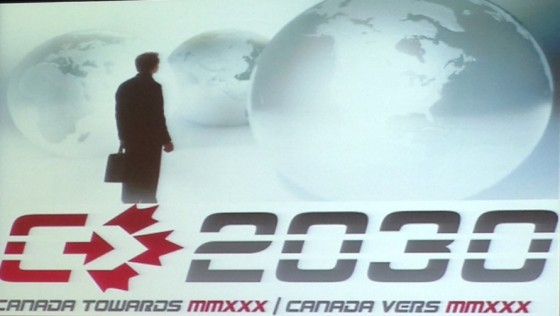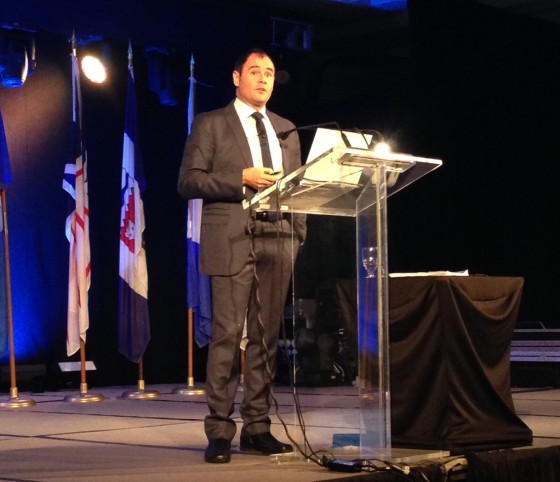Photo: Hilary Tuttle
WINNIPEG, MANITOBA, Canada — In keeping with this year’s RIMS Canada Conference theme, “Crossroads: Changing Landscapes,” Eric Noël, senior vice president of Oxford Analytica in North America and initiator of the Canada Towards 2030 Project, presented research and projections on the top trends that will shape the nation’s future.
“Risk managers cannot afford to freeze in the face of uncertainty or change, and the longer a difficult decision is delayed, the higher its cost, so this is a call for action,” Noël said.
“Remember that failing to plan is planning to fail.”
Yet projecting out 16 years introduces many ideas and problems that cannot accurately be planned for today. Instead, the planning he encourages is strategic and much broader in scope, examining broad trends, then drilling down into specific political, economic, and environmental implications. For example, Noël said, “Black swans will be the dictator of geopolitical change.
” While such events cannot be planned for specifically, it is critical to consider long-term questions of how to engage in global power systems and what areas of primary strength the nation should focus on.
 In other areas, key trends and questions for strategic risk management planning include:
In other areas, key trends and questions for strategic risk management planning include:
• The most important population trend in Canada is migrations and the resultant political shift. Because of the tremendous shift west and the allocation of votes, a future prime minister could be elected without a single vote from Quebec, bringing dramatically different priorities into office than a candidate who requires the support of the East.
• Aging will not only impact the workforce and demands on the medical system, but will also signal changes in the country’s median income, sovereign debt ranking, and provincial budgets. A larger number of retirees and elderly citizens will increase retirement benefit spending to 13% of Canada’s GDP, and the provinces must start setting aside billions now to pay for that care.
• The first group of less financially-prepared, due to changes in saving practices, will soon be retiring. This will prompt deleveraging and scaling down, whether that means selling their vacation homes or cutting back on lifestyle spending. Further, for those with the financial means, there will be an increase in the number of people with the ability to snowbird. This will have a significant impact on Canada, at the city level, when thousands of residents depart for several months every year.
• Canada’s booming oil industry may be a double-edged sword due to finite resources. The addiction to fuel is becoming an addiction to fiscal incomes for parts of the country as oil royalties surge.
• Political risk is underrated in emerging markets, and emerging markets are quickly becoming divergent markets.
“The next economies trying to achieve that $1 trillion level in the future are countries transitioning from the hundreds of billion in GDP such as Indonesia, Turkey, Saudi Arabia, Nigeria, Argentina, etc,” said Noël. “They have nothing in common with our current $1 trillion economies clients in terms of stability and due to their particular political systems will have us re-assess our risks more than just once quantitative easing is gone or China has slowed down. Political risk matters a lot for the future of globalization.” BRIC-centric thinking will no longer suffice and current global powers will have to adapt to cooperate with these new players, or they may opt to ally more closely with similar nations instead.
The Canada Towards 2030 Project is an apolitical, independent and non-prescriptive initiative dedicated to creating and sharing long-term research about Canada’s future. According to the group, “Uncertainties should not frighten or paralyze us; they should help us anticipate and prepare. Avoiding or minimizing a risk—as well as finding and maximizing a new opportunity—requires imagination and leadership.”
To that end, Noël and his team aim to use research and non-prescriptive thought leadership on some of the biggest topics shaping the future of the country, including labor, agriculture, governance, oil production and consumption and water supply. “The mission of the C2030 project is to offer a high quality forward-thinking experience to people interested in exploring the future of Canada, increasing their awareness of long-term trends, helping them improve their ability to anticipate change and facilitate the creation of or adaptation to the future they want,” the website explains.



